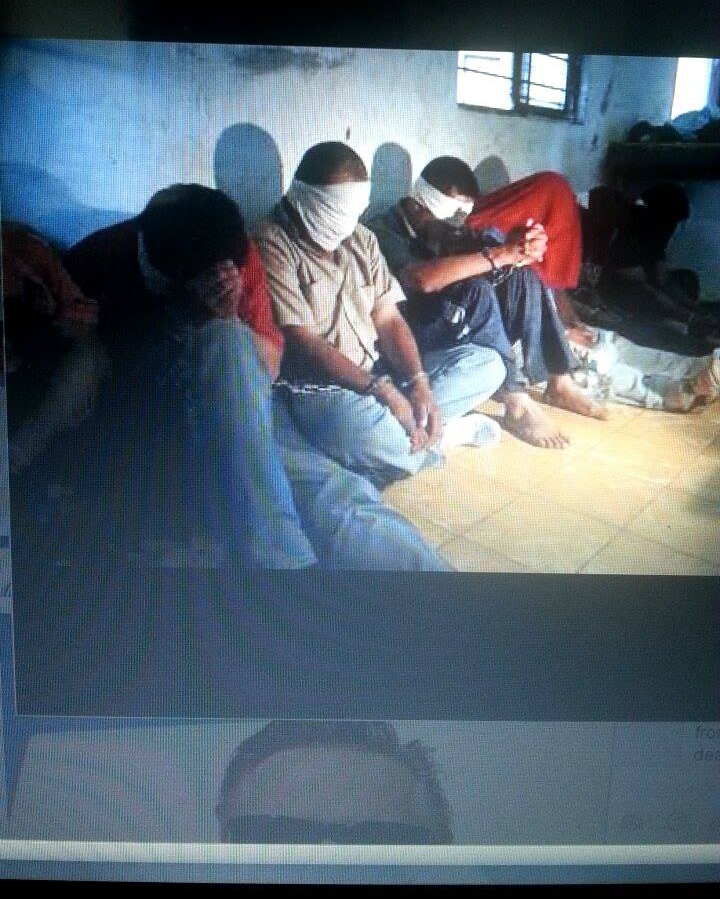
SCARS Institute’s Encyclopedia of Scams™ Published Continuously for 25 Years

Another Evolution In Scamming Are Kidnapping Scams
Scammers Connect Via A Fake Profile That Then Says They Have Been Kidnapped
It sounds like something out of Hollywood, but it’s hitting homes across the country: “virtual kidnapping,” where fraudsters try to extort money by claiming that a family member has been taken hostage.
This fear-provoking fraud isn’t new; there was a nationwide wave of similar calls two years ago in which swindlers usually claimed a loved one was being held after causing a traffic accident and refusing to pay for damages. But in recent weeks, the scam has exploded — and this go-round has been refined with more convincing “legitimacy.”
The scammer first establishes a relationship with the prospect victim, then after time, instead of simply asking for money as usual, says here or she has been kidnapped. They say they are being held by
Unfortunately, this is all designed to quickly overcome the victim and force them to send money to the scammers. Because this is a very rapid close, the victim has little or no time to think. The scammers also threaten the victim and his/her family.
The good news is that it is all a scam.
What makes it so compelling is that there are kidnappings all over the world, and it is engineered to look like a real kidnapping.
How It Works
“A caller might attempt to convince a victim that his daughter was kidnapped by having a young female scream for help in the background during the call,” reports the FBI, which issued a Jan. 13 warning about an increase in this scheme in New York City. (That week, one New Jersey man paid $7,200 after being told that his father was being held.)
“Often the reason they are holding the alleged victim varies, but some of the most prominent scams involve car accidents, drug debts, gang assaults or persons being smuggled across the border,” the FBI states.
How They Find You?
Names and phone numbers are gleaned from people-search websites, online directories or social media. An accomplice provides the voice-over. In fact, calls sometimes originate in Puerto Rico, according to the FBI, and the dialing kidnapper (and alleged hostage) may even be outside the U.S.
But it’s a familiar and profitable formula, especially when the targets are those 50 and older. Trying to provoke fear is at the root of most top scams reported to our Fraud Watch Network, and historically those over age 50 are more likely than others to lose money in intimidation scams.
Still not enough to convince you that your loved one wasn’t actually kidnapped? Look for these scam-busting clues so you can hang up your phone even more quickly:
- Your caller ID indicates that the call is coming from an outside area code. Area codes 787 and 939 are for Puerto Rico.
- Calls do not come from the kidnapped victim’s phone.
- Callers go to great lengths to keep you on the phone but refuse to let you speak with the hostage.
- Ransom money is accepted only via a wire-transfer service (Western Union, MoneyGram). This allows scammers to redeem the payment anywhere in the world — no matter their claimed location.
In all cases, authorities say, it’s nothing more than a heart-pounding hoax.
Look at these photos for a perfect example:
Per one news story:
How much would you pay for the life of your wife or husband? What about your brother or sister? Mother or father? Son or daughter? Can you put a price on your loved ones? Telephone scammers are betting you’d pay anything to keep your family safe.
I got one of those “you won’t believe what just happened” calls not too long ago. A friend of a friend of a friend and his wife were virtually kidnapped at the same time. No, it’s not the mutated cousin of identity theft. It’s a telephone scam. The very next day I had the husband on the phone explaining what happened.
“I was at work and I received a call and when I answered the phone, the guy told me my wife had been in an accident,” Juan Toro, a Miami Lakes resident said.
His name is Juan Toro, a Miami Lakes resident. Probably a large percentage of the American population knows of e-mail and phone scams by now like the Nigerian Princes wanting to give away their vast wealth for no reason, but this is different. The man on the line is asking Toro for $1,500 in return for his wife.
“So I was just scared. I mean, you know what, $1,500 is not worth my wife’s life. What if I gamble and it’s true? How do I live with myself?” Toro said.
Toro didn’t hang up. The stranger on the line continued – Toro’s wife got into a car accident with the stranger and his cousin. But the two were wanted by the law and in a panic the cousin beat her up. They say she’s getting stitches and Toro needs to pay the $1,500 for damages to the stranger’s car. But what Toro didn’t know was at the exact same time, the scammers were telling the exact same lie to his wife about him. Marcos Rodriguez with the Miami-Dade Economic Crimes Bureau says there’s a better chance of them being in a Puerto Rican jail than Miami.
“Inmates are Puerto Rico that have these pre-paid phones that they’re smuggling into the prison cells,” Rodriguez said.
Even though the victims are in Florida, the criminals are in Puerto Rico. Any crime reports filed in Miami-Dade are sent to Puerto Rico to deal with the criminals. The San Juan Police Department couldn’t be reached for comment. But Rodriguez says there are raids of the jails every so often and phones are found, yet there’s not much else they can do. In the U.S. State Department, Christine Jackson is a Citizen Services Specialist dealing with this scam and others like it at the international level. Calls are also coming out of Mexico to all across the U.S. She says the best way to fight the scam is to just hang up the phone.
“I would say it’s impossible to stop scammers from calling. It is possible to stop them from ever being successful. And that is by not falling victim to their lies on the phone,” Jackson said.
Meanwhile Toro is driving from hospital to hospital. He’s paid the $1,500 through Western Union. And so too has his wife. The scammers say she’s at one hospital, and then they say she’s at another. “Then I spoke to my wife. So I got to hear my wife,” Toro said.
Toro said it only lasted for a few seconds. Enough time to say, “I’m alright. Do what you’re told.” He thinks they set up a three-way call between the phones. They asked for more money. He tried to send out a text for help.
“At this time they had called me twice. I picked up the other line and it was them again so they had my phone. Both lines were occupied so I couldn’t receive any calls or anything. My phone was blocked. I was trying to send texts out but text for some reason text wouldn’t go out,” Toro said.
He tried and failed to send them more money. He got a text through. His wife was safe. He hung up the phone. According to the Miami-Dade Economic Crimes Bureau the kidnapping scams have gone on for about the past two years. They’re targeting Spanish speakers. So it makes sense the vast majority of these scams are happening in South Florida. Though it’s happening far too often. Hortensia Lorie is another victim of the crime. In her case, the scammers slipped and said her brother drove a van when he actually drove a truck. She hung up. After she got in contact with her brother she called police dispatch “and she had a little chuckle. And she said, ‘you know I’m sorry I’m chuckling but I just got on shift and you are like the, maybe 40th call that I’ve gotten about this,” said Lorie.
That’s about the same thing a Pembroke Pines officer told Toro after his ordeal. And Rodriguez with the Miami-Dade Economic Crimes Bureau says, sounds about right.
“Personally I’ve spoken to people that they’ve been called several times within a month. And what they’ll do is they’ll call, they’ll say, ‘we have your daughter.’ And you know, what are you talking about I don’t have a daughter and they hang up the phone. So now they know they don’t have a daughter. And a couple weeks later they’ll call back and you know, ‘well your son,’” said Rodriguez.
Of course that places a conundrum on the whole thing. Are they organized enough to call a husband and wife at the same time and play them off one another? Or are they just calling any number they can find in the phone book? They’re specifically calling Spanish speakers, but don’t know if whom they’re calling has a son or a daughter, a sister or a brother. Jackson she says the level of organization is… well… random.
“Based on the range of calls we get, truly, I think there is a range. I think there are individuals out there who are kind of doing it on their own and I think there are far more organized. For example, for the grandparent scam, there really seem to be some who have set it up essentially like a small call center, like, you know, how you get robo-calls during election time,” Jackson said.
The scammers dialed three grand out of Toro and his wife but he doesn’t think he could change what happened.
“Well it’s just one of things that, you may think you’re prepared for because I’ve heard of scams and I’ve always said, ‘you know what? How could people fall for it? But you know once you’re in that situation it’s totally different,” Toro said.
Florida Attorney General Pam Bondi said she will ask her consumer protection agency to look into the scam. Though in the end, everyone had the same advice: take a deep breath, ask some questions – the scammers probably won’t be able to answer in detail – and find out who it is and who it isn’t.
-/ 30 /-
What do you think about this?
Please share your thoughts in a comment below!
LEAVE A COMMENT?
Recent Comments
On Other Articles
- Arwyn Lautenschlager on Love Bombing And How Romance Scam Victims Are Forced To Feel: “I was love bombed to the point that I would do just about anything for the scammer(s). I was told…” Feb 11, 14:24
- on Dani Daniels (Kira Lee Orsag): Another Scammer’s Favorite: “You provide a valuable service! I wish more people knew about it!” Feb 10, 15:05
- on Danielle Delaunay/Danielle Genevieve – Stolen Identity/Stolen Photos – Impersonation Victim UPDATED 2024: “We highly recommend that you simply turn away form the scam and scammers, and focus on the development of a…” Feb 4, 19:47
- on The Art Of Deception: The Fundamental Principals Of Successful Deceptions – 2024: “I experienced many of the deceptive tactics that romance scammers use. I was told various stories of hardship and why…” Feb 4, 15:27
- on Danielle Delaunay/Danielle Genevieve – Stolen Identity/Stolen Photos – Impersonation Victim UPDATED 2024: “Yes, I’m in that exact situation also. “Danielle” has seriously scammed me for 3 years now. “She” (he) doesn’t know…” Feb 4, 14:58
- on An Essay on Justice and Money Recovery – 2026: “you are so right I accidentally clicked on online justice I signed an agreement for 12k upfront but cd only…” Feb 3, 08:16
- on The SCARS Institute Top 50 Celebrity Impersonation Scams – 2025: “Quora has had visits from scammers pretending to be Keanu Reeves and Paul McCartney in 2025 and 2026.” Jan 27, 17:45
- on Scam Victims Should Limit Their Exposure To Scam News & Scammer Photos: “I used to look at scammers photos all the time; however, I don’t feel the need to do it anymore.…” Jan 26, 23:19
- on After A Scam, No One Can Tell You How You Will React: “This article was very informative, my scams happened 5 years ago; however, l do remember several of those emotions and/or…” Jan 23, 17:17
- on Situational Awareness and How Trauma Makes Scam Victims Less Safe – 2024: “I need to be more observant and I am practicing situational awareness. I’m saving this article to remind me of…” Jan 21, 22:55
ARTICLE META
Important Information for New Scam Victims
- Please visit www.ScamVictimsSupport.org – a SCARS Website for New Scam Victims & Sextortion Victims
- Enroll in FREE SCARS Scam Survivor’s School now at www.SCARSeducation.org
- Please visit www.ScamPsychology.org – to more fully understand the psychological concepts involved in scams and scam victim recovery
If you are looking for local trauma counselors please visit counseling.AgainstScams.org or join SCARS for our counseling/therapy benefit: membership.AgainstScams.org
If you need to speak with someone now, you can dial 988 or find phone numbers for crisis hotlines all around the world here: www.opencounseling.com/suicide-hotlines
A Note About Labeling!
We often use the term ‘scam victim’ in our articles, but this is a convenience to help those searching for information in search engines like Google. It is just a convenience and has no deeper meaning. If you have come through such an experience, YOU are a Survivor! It was not your fault. You are not alone! Axios!
A Question of Trust
At the SCARS Institute, we invite you to do your own research on the topics we speak about and publish, Our team investigates the subject being discussed, especially when it comes to understanding the scam victims-survivors experience. You can do Google searches but in many cases, you will have to wade through scientific papers and studies. However, remember that biases and perspectives matter and influence the outcome. Regardless, we encourage you to explore these topics as thoroughly as you can for your own awareness.
Statement About Victim Blaming
SCARS Institute articles examine different aspects of the scam victim experience, as well as those who may have been secondary victims. This work focuses on understanding victimization through the science of victimology, including common psychological and behavioral responses. The purpose is to help victims and survivors understand why these crimes occurred, reduce shame and self-blame, strengthen recovery programs and victim opportunities, and lower the risk of future victimization.
At times, these discussions may sound uncomfortable, overwhelming, or may be mistaken for blame. They are not. Scam victims are never blamed. Our goal is to explain the mechanisms of deception and the human responses that scammers exploit, and the processes that occur after the scam ends, so victims can better understand what happened to them and why it felt convincing at the time, and what the path looks like going forward.
Articles that address the psychology, neurology, physiology, and other characteristics of scams and the victim experience recognize that all people share cognitive and emotional traits that can be manipulated under the right conditions. These characteristics are not flaws. They are normal human functions that criminals deliberately exploit. Victims typically have little awareness of these mechanisms while a scam is unfolding and a very limited ability to control them. Awareness often comes only after the harm has occurred.
By explaining these processes, these articles help victims make sense of their experiences, understand common post-scam reactions, and identify ways to protect themselves moving forward. This knowledge supports recovery by replacing confusion and self-blame with clarity, context, and self-compassion.
Additional educational material on these topics is available at ScamPsychology.org – ScamsNOW.com and other SCARS Institute websites.
Psychology Disclaimer:
All articles about psychology and the human brain on this website are for information & education only
The information provided in this article is intended for educational and self-help purposes only and should not be construed as a substitute for professional therapy or counseling.
While any self-help techniques outlined herein may be beneficial for scam victims seeking to recover from their experience and move towards recovery, it is important to consult with a qualified mental health professional before initiating any course of action. Each individual’s experience and needs are unique, and what works for one person may not be suitable for another.
Additionally, any approach may not be appropriate for individuals with certain pre-existing mental health conditions or trauma histories. It is advisable to seek guidance from a licensed therapist or counselor who can provide personalized support, guidance, and treatment tailored to your specific needs.
If you are experiencing significant distress or emotional difficulties related to a scam or other traumatic event, please consult your doctor or mental health provider for appropriate care and support.
Also read our SCARS Institute Statement about Professional Care for Scam Victims – click here to go to our ScamsNOW.com website.






















Thank you for your comment. You may receive an email to follow up. We never share your data with marketers.